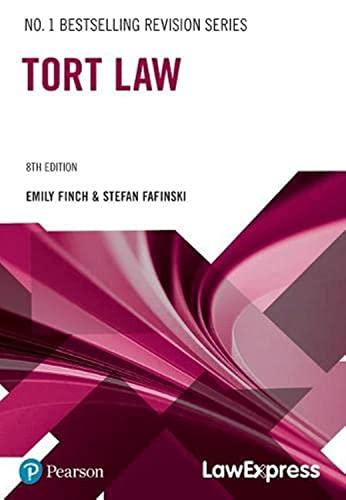Question
16.Article I of the Constitution allocates the legislative power to _____. the chief justice the president associate justices the Cabinet Congress 17.Who acts as the
16.Article I of the Constitution allocates the legislative power to _____.
the chief justice
the president
associate justices
the Cabinet
Congress
17.Who acts as the primary means of enforcing judicial decisions?
The Supreme Court justice
A special administrative agency
The legislative branch
The President
The people
20.Which of the following is NOT true of torts?
Some states are friendlier towards tort claims than others.
A tort is any civil wrong outside of a breach of contract.
Torts are state based.
A decision based on a tort cannot be appealed.
Torts cover situations in which legal injury is suffered by people and businesses.
24.The Supreme Court is most likely to grant certiorari when:
well-known lawyers file the petition.
the defendant has no criminal records.
asked by the president.
indigent litigants file in forma pauperis petitions.
there is a circuit split.
31.Personal jurisdiction requires litigants to have some form of _____ with the state where the case is filed.
minimum contacts
writ of certiorari
res judicata
sua sponte
voir dire
36.The standard of proof in a civil trial is:
preponderance of the evidence
affirmative defense
beyond a reasonable doubt
in forma pauperis
presumption of innocence
43.Benefits of negotiation as a method of alternative dispute resolution include:
no set rules.
freedom to parties to bargain unethically.
involvement of a neutral party.
potential for speedy resolution.
guaranteed resolution of conflict.
44.Which of the following is a drawback to negotiation as a method of alternative dispute resolution?
Slow resolution
Parties participate involuntarily
Lack of privacy
The expensive nature of participation
No set rules
46.Which of the following statements is true of mediation?
It involves more costs when compared to litigation.
If an agreement is reached, the mediation itself is usually binding.
It is more formal than negotiation but less formal than arbitration or litigation.
The mediator renders a verdict in favor of one side or the other.
Regardless of the fact of disputants' reluctance to participate in the mediation process, the mediation will work.
57.Which of the following types of speech is generally recognized by courts as speech most deserving of protection?
Commercial speech
Obscene speech
Political speech
Symbolic speech
Confrontation speech
Step by Step Solution
There are 3 Steps involved in it
Step: 1

Get Instant Access to Expert-Tailored Solutions
See step-by-step solutions with expert insights and AI powered tools for academic success
Step: 2

Step: 3

Ace Your Homework with AI
Get the answers you need in no time with our AI-driven, step-by-step assistance
Get Started


